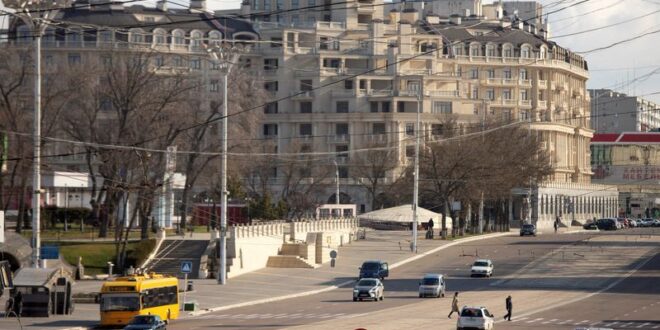CHISINAU (Reuters) – A week after the European Union launched membership talks with Moldova, the country’s separatist region complained on Tuesday that central authorities had ignored its proposals to settle their long-running dispute and imposed a “banking blockade”.
The leader of the pro-Russian separatist Transdniestria region, Igor Krasnoselsky, told the EU ambassador in a rare meeting that Moldova’s government had ignored its proposed declaration calling for a peaceful settlement.
“The declaration is a good, positive step. The Moldovan position, refusing to sign a document about peace, is incomprehensible,” Krasnoselsky told EU ambassador Jānis Mažeiks, referring to the document he said was presented in May.
“Everyone, including the Moldovan side, talks about peace and ruling out aggression. Let’s sign and make this wish plain.”
Krasnoselsky also told the ambassador that the bank accounts of Transdniestrian businesses in Moldovan banks had been closed, restricting their access to EU programmes intended to ease trade with the 27-member bloc.
This, he said, amounted to a “banking blockade”.
Transdniestrian authorities earlier this year denounced Moldovan customs duties on goods leaving and entering the region, and elected officials called for help from Russia.
Transdniestria, a sliver of land on the border with Ukraine, split from Moldova in the final days of Soviet rule and engaged in a brief 1992 war with the newly independent state.
It functions with heavy backing from Moscow and the two sides have existed side by side with few incidents for more than 30 years.
Moldova seeks an overall solution under which the region would be fully integrated into its territory.
But Russia’s 2022 invasion of Ukraine had halted all efforts of the “5+2” talks to find a settlement, which included Russia, Ukraine and the Organisation for Security and Cooperation in Europe as well as the European Union and the United States.
Moldova’s Bureau for Reintegration told the newsmaker.md news outlet that the proposed declaration had “unscrupulous aims” and pledged to press on with its diplomatic efforts.
Moldovan President Maia Sandu has made EU membership the cornerstone of her policies in the country lying between Ukraine and Romania. Membership talks opened with Moldova and Ukraine last week and Moldova hopes it will be able to join by 2030.
Sandu has called an October referendum on joining the bloc, to be held alongside a presidential poll in which she is seeking re-election.
(Reporting by Alexander Tanas, Editing by Ron Popeski and Josie Kao)
 BeritaKini.biz Berita Viral Terkini di Malaysia
BeritaKini.biz Berita Viral Terkini di Malaysia





